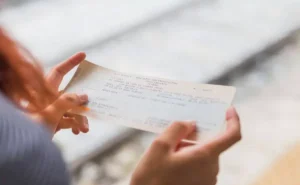When you’ve received an inheritance check, you may need clarification about how to cash or deposit the estate check when there is no estate. If you don’t have a clear solution, this process can be complicated and result in frustration and dissatisfaction.
Because this is a step-by-step process, we advise you to follow specific tips on depositing or cashing this type of check when there is no formal inheritance.
A check made out to the deceased or their estate is typically estate property and should be deposited into the estate account, not your own personal bank account. An estate account is a temporary bank account that holds an estate’s money.
Suppose there is a check that is written from the estate. In this case, it would only have to be drawn by an executor or administrator appointed to deal with the estate’s affairs or distribute it to the concerned heirs or beneficiaries.
Has the estate been opened in probate court, and a personal representative/executor appointed over the property?
If yes, then the following steps should be taken:
If not, then
An estate check should be deposited into an estate account established by the designated executor or administrator for the decedent’s belongings.
If the check that has been made out to the estate voids after a certain period, there can always be a request from the appointed personal representative later for the check to be reissued.
It’s essential to ensure that all estate checks are safeguarded until the executor or administrator is appointed, and then they should deposit those funds into the estate account.
When there are assets belonging to the deceased and do not have a designated beneficiary listed on them, there is a potential estate.
If a check has been written in the deceased’s name or the estate, probate may be necessary to cash it and distribute it to heirs and beneficiaries.
If there is a will, it usually follows the probate process, and it’s the surest method to ensure everything is in order and protect your loved one’s assets.
When there is no will, one potential option is a petition to declare no administration necessary. But it is rarely used, and usually, it’s suitable for very small properties when all the parties involved agree to a written distribution plan.
We have found that, in practice, this petition is not very useful. It seems to save time, but often, it leads to more complications than a standard probate process.
Also, declaring no administration necessary can’t be used when:
Still, no administration necessary can be a potential option when the property has few assets, no creditors, and all family members agree.
Filing this petition is only possible under limited circumstances and strict requirements.
The only way to open a new estate account is to reopen the Estate if it has been closed.

The estate check itself may be considered a part of the estate.
If probate has not been opened, and there is a will, then the named executor will begin the probate process to become appointed as designated executor by the court.
Once designated, the executor should open an estate account, and any funds for the estate should be deposited into this account.
If there are any checks for the succession or in the name of the deceased, they should be turned over to the personal representative/executor of the property to be deposited into the estate account.
If there is no will,
The estate check is deposited into the estate bank account that the executor or administrator holds.
The bank may request to see the executor or administrator’s letters to open the estate’s bank account. In this case:
The financial institution may need to be notified that a person has passed away, and they may reissue a check in the estate’s name.
The check will not be cashed but deposited into the estate account, which differs from a regular bank account.
If there is a will, the executor endorses the check as “John Smith, as the Executor of the Estate of John Doe.”
When there is no will, he will endorse the check as “John Smith, as the Administrator of the Estate of John Doe.”
The executor or administrator does not sign checks for the deceased. They sign checks on behalf of the estate.
An executor can only do this after the probate court has appointed them and they have set up an estate checking account.
If an estate has not been opened with the probate court:
This is not possible in Georgia.
We recommend you reach out to our office to discuss your specific situation with a probate lawyer.
Yes, but the check should be turned over to the estate administrator or executor, who will deposit it into the estate checking account.
First, you must understand that the check belongs to the deceased’s estate, not to you. Consequently, you need legal authority to deposit the check, which usually means being named the executor or administrator of the estate.
Depending on the situation. We must review the situation before we can give a definitive answer.
To deposit a check made out to a deceased spouse, you must open an estate (as discussed above) or get an order for a year’s support that makes the check the property of the surviving spouse.
If you’d like to talk with a specialist about handling the estate checks, please call our office at (770) 637-3272 or schedule a consultation. We’re happy to help.
Disclaimer These websites have not been reviewed by Georgia Probate Law Group and are not endorsed or even recommended by Georgia Probate Law Group. These websites are additional resources that you can use to further your general education on this topic.
Disclaimer: The information above is provided for general information only and should not be considered legal advice. Our probate attorneys provide legal advice to our clients after talking about the specific circumstances of the client’s situation. Our law firm cannot give you legal advice unless we understand your situation by talking with you. Please contact our law office to receive specific information about your situation.
Compassionate listeners, knowledgeable guidance. Schedule a free consultation with our team and let us help you and your family with your legal concerns.
GET IN TOUCH 770-796-4685Learn Important Probate Essentials, including key things that go wrong in an estate, how to prevent them, and what to do if they happen.



© 2025 Georgia Probate Law Group by Broel Law, LLC. All rights reserved.